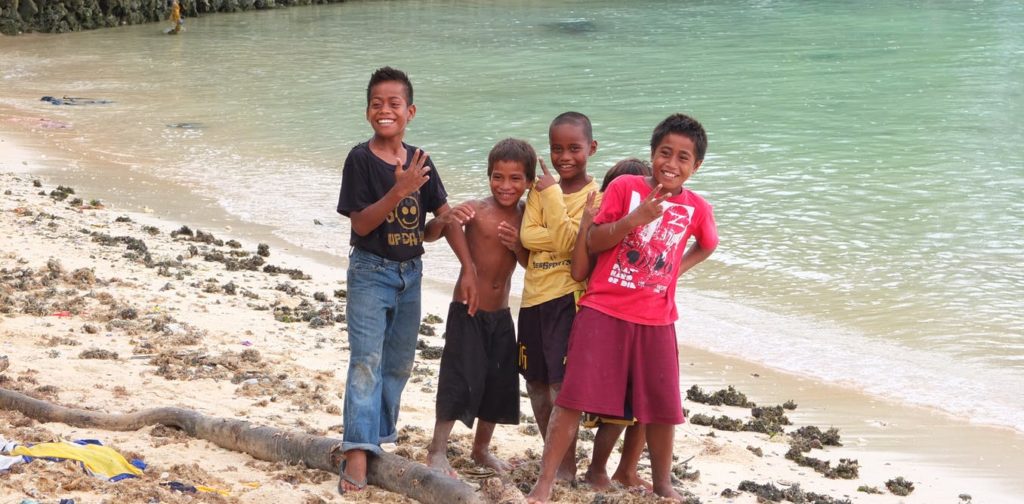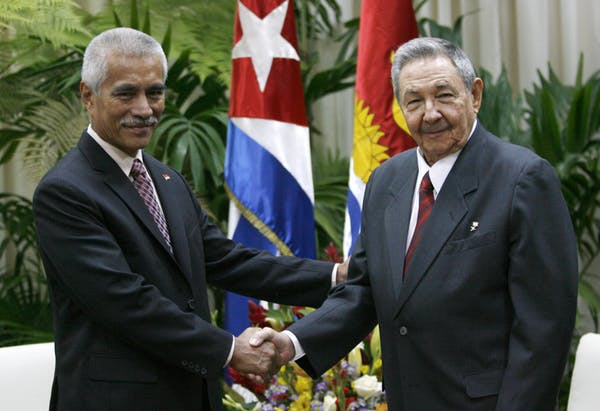Cuban Compassion: Training Doctors for a Pacific Island Nation Running Out of Time
IN FOCUS, HEALTH, ASIA--PACIFIC, LATIN AMERICA AND THE CARIBBEAN, COOPS-COOPERATION-SHARING, SCIENCE, INSPIRATIONAL, 5 Aug 2019
Robert Huish and Sharon McLennan – The Conversation

Boys play on a beach in Kiribati in 2014. Cuba is training doctors to tend to people on the Pacific island nation, struggling with disease amid the worsening effects of climate change.
(Shutterstock)
11 Jul 2019 – Kiribati.
You may not know where it is.
Pronouncing it is tricky (Ker-a-bas). It’s a small republic of 114,000 people spread out over 32 atolls in the middle of the Pacific Ocean, near the international date line and right on the equator.
Palm trees line the white sandy shores. Turquoise water laps the sand. But is it an ideal island oasis? Hardly.
The battle of Tarawa, a horrific skirmish in the Second World War, took place on Kiribati. And now a climate change battle is crashing on its shores amid a crisis of tuberculosis, leprosy and other damnations.
Most of Kiribati sits about two metres above sea level. The Intergovernmental Panel on Climate Change estimates that sea levels will rise at least two metres before the year 2100. This gives Kiribati no more than 80 years.
Anote Tong, the former president of Kiribati, has said that for “Kiribati it is already too late” and that the international community should consider how people can migrate with dignity.
In response, Australia and New Zealand offer temporary escape, while Fiji sold 5,500 acres of its land to Kiribati for $8.77 million dollars. If all I-Kiribati, as the nation’s people are known, occupied this land the population density would be about 5,300 people per square kilometre. This violates the UNHCR’s minimum standards for refugee camps.
But as others work to help the I-Kiribati flee, Cuba encourages them to stay. Havana is training I-Kiribati physicians for free with the condition that they will return to work in their home country. Why?
First, let’s take a look at what New Zealand and Australia are proposing for Kiribati and other Pacific island nations.
Encouraging migration
Jacinda Ardern, New Zealand’s prime minister, proposed a climate-change refugee visa program for Pacific island states, including Kiribati. But the New Zealand government scrapped the plan in August 2018 in response to concerns from Pacific island leaders about the self-determination of their peoples. New Zealand’s immigration minister, Iain Lees-Galloway, noted:
“Pacific peoples have expressed desire to continue to live in their own countries, and current work is primarily focused on mitigating the impacts of climate change.”
What does that work look like?
New Zealand’s “development co-operation” with Kiribati includes building hospital facilities, increasing family-planning options, bolstering the fishing sector, improving doctor qualifications and facilitating labour mobility schemes to help I-Kiribati find employment offshore.
Australia’s development assistance initiatives for Kiribati involves moving low- or semi-skilled workers to Australian communities on temporary work visas to help with “seasonal labour shortages.”
If Pacific peoples want to stay on their islands, why do Australian and New Zealand aid programs have not-so-hidden agendas of moving people off of the atolls?
kiribati cuba2
Certainly it’s more than Washington’s USAID, and Ottawa’s Global Affairs Canada — the foreign development branches of two countries with enormous carbon footprints — are doing for Kiribati. Neither country is offering any assistance to Kiribati.
Cuba training doctors
Enter Cuba. The country is offering close to 40 medical scholarships to Kiribati, which will nearly double the country’s physician workforce, and all under the idea that they should remain on the atolls.

Cuba’s President Raúl Castro, right, shakes hands with Anote Tong, then Kiribati’s president, in Havana in December 2010.
(AP Photo/Ismael Francisco, Prensa Latina)
Beyond the climate tragedy, Kiribati faces compounding health calamities. Almost 700 cases of active tuberculosis were recorded in 2018, along with 155 new cases of leprosy. While these conditions are often treated at the hospital in Tarawa, there is little in place to prevent these maladies from occurring.
On top of this is a dengue crisis. Almost one in two children are stunted, and one in four adults have Type 2 diabetes. Both are the result of serious nutritional deficiencies. The lack of sanitation also makes the country’s lagoons toxic, making rainwater the only drinking water.
With only 59 physicians in the country, more are needed. Kiribati’s treatment of tuberculosis and leprosy meets basic needs, but almost nothing is in place for physicians to actively work on disease prevention.
Cuba’s medical education is well known for building community-level routines of health promotion around the world.
Aiming to improve health on Kiribati
Compare Cuba’s plan — to build better health from within Kiribati itself — to temporary work permits and a refugee settlement on an overcrowded parcel of land.
It’s a bold statement to offer a program that encourages skilled professionals to remain in the eye of the storm. And yet it reaffirms the “desire to remain,” as Lees-Galloway mentioned.
It also echoes Tong’s claim that by the time that Kiribati disappears, “no one will be immune from the catastrophic consequences of climate change.”
Extreme climatic events will alter human existence. And as they do, the question remains: How well will we take care of each other?
Will donor nations engage in development co-operation to foster health and livelihoods for a nation of future climate change migrants? Or will it come down to a few temporary visas for low-skilled workers who would otherwise be pressed into a refugee camp? Already, New Zealand has offered additional training and support to the I-Kiribiati graduates from Cuba working in the Pacific. Such support is encouraging.
But Cuba, in particular, offers a compelling example of how we can take care of each other during the climate crisis, regardless of where we are on the planet.
Kiribati is the first land to run out of time. Where will be next? And how will we take care of each other?
_________________________________________
Robert Huish – Associate Professor in International Development Studies, Dalhousie University
Sharon McLennan – Lecturer in International Development, Massey University
Republish our articles for free, online or in print, under Creative Commons license.
Go to Original – theconversation.com
Tags: Africa, Asia and the Pacific, Cooperation, Cuba, Development, Economics, Human Rights, International Relations, Kiribati, Latin America Caribbean, Nonviolence, Pacific Islands, Peace, Politics, Public Health, Social justice, Solutions
DISCLAIMER: The statements, views and opinions expressed in pieces republished here are solely those of the authors and do not necessarily represent those of TMS. In accordance with title 17 U.S.C. section 107, this material is distributed without profit to those who have expressed a prior interest in receiving the included information for research and educational purposes. TMS has no affiliation whatsoever with the originator of this article nor is TMS endorsed or sponsored by the originator. “GO TO ORIGINAL” links are provided as a convenience to our readers and allow for verification of authenticity. However, as originating pages are often updated by their originating host sites, the versions posted may not match the versions our readers view when clicking the “GO TO ORIGINAL” links. This site contains copyrighted material the use of which has not always been specifically authorized by the copyright owner. We are making such material available in our efforts to advance understanding of environmental, political, human rights, economic, democracy, scientific, and social justice issues, etc. We believe this constitutes a ‘fair use’ of any such copyrighted material as provided for in section 107 of the US Copyright Law. In accordance with Title 17 U.S.C. Section 107, the material on this site is distributed without profit to those who have expressed a prior interest in receiving the included information for research and educational purposes. For more information go to: http://www.law.cornell.edu/uscode/17/107.shtml. If you wish to use copyrighted material from this site for purposes of your own that go beyond ‘fair use’, you must obtain permission from the copyright owner.
One Response to “Cuban Compassion: Training Doctors for a Pacific Island Nation Running Out of Time”
Read more
Click here to go to the current weekly digest or pick another article:
IN FOCUS:
- The Paradox of Israel’s Role in the Armenia-Azerbaijan Conflict: A Christian Bastion Betrayed?
- US ‘Demands Control’ from Ukraine of Key Pipeline Carrying Russian Gas
- Giving Birth to the New International Order
HEALTH:
- U.S. Terminates Funding for Polio, H.I.V., Malaria and Nutrition Programs Around the World
- Autism, Made in the USA
- Big Pharma Is a Big Menace to Global Health
ASIA--PACIFIC:
- Identity Politics, Sexual Politics, and Violence against People in Sri Lanka
- The Hawaiians Who Want Their Nation Back
- The Hidden Meaning of the Martial Law in South Korea
LATIN AMERICA AND THE CARIBBEAN:
- ‘Haiti’s Survival Is at Stake,’ Says UN Expert, Warning of Worsening Crisis
- Women's Interdepartmental Coalition of Haiti
- Biden or Trump, US Latin American Policy Remains Contemptible: Migration, Drugs, Tariffs
COOPS-COOPERATION-SHARING:
- In a Violent Economy, People of Faith Try Cooperatives
- Formerly Incarcerated Women Launch Chicago Worker Cooperative
- The Boss Who Put Everyone on 70K
SCIENCE:
- Do Other Animals Have Consciousness? Science Could Force Us to Rethink Our Relationships with Them
- Newcastle Student Investigates Roman 12-Sided 'Mystery Objects'
- Scientists Create Artificial Worm Gut That Breaks Down Plastic
INSPIRATIONAL:


I spent two years in Kiribati in the 1970s when it was part of the Gilbert and Ellice Islands Colony-a colony of the UK, with lots of ex-colonial Africa Brits as public servants and teachers. Lovely people but even then very limited opportunities for “development”. Cuba is marvellous in taking on tasks others do not even consider. let us hope they can make a difference here.